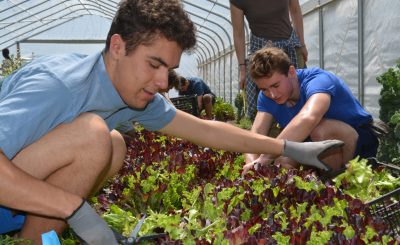The United World College-USA in Montezuma, N.M., is the first high school to earn a sustainability rating from the Association for the Advancement of Sustainability in Higher Education.
With more than 900 participants in 40 countries, AASHE’s STARS program is the most widely recognized framework in the world for colleges and universities to publicly report their sustainability performance.
“Such exciting news indeed and what an amazing accomplishment for the school,” Heather Lynch, AASHE Membership Operations Coordinator wrote in a congratulatory email. “The team should be very proud of the amazing work you are doing at UWC-USA.”
Established in 2005, AASHE worked with the higher education community to develop the Sustainability Tracking, Assessment & Rating System. STARS has more than 60 credits distributed across five categories: academics, engagement, operations, planning and administration, and innovation and leadership. Members earn a bronze, silver, gold or platinum rating for their sustainability activities based on the total percentage of credits earned. UWC-USA earned a bronze.
David Neidel ’87 worked with students, faculty, and staff to conduct the campus sustainability audit while serving as an alumni-in-residence on the Montezuma campus during the Fall 2019 semester.
“I think it’s a testament to the college leadership’s commitment to sustainability that they were willing to have the college’s performance evaluated against the industry standard for higher education,” Neidel said. “It is one thing to say that the UWC mission includes sustainability and to have some individual initiatives. It’s completely another to approach it in such a comprehensive manner.”
Now that UWC-USA has adopted a baseline, Neidel believes UWC-USA will see significant improvements in the years to come.
“The school does recycle and compost much of its solid waste, but didn’t get any credits in that area because of inadequate data,” he said, noting that among other areas where the school is exploring options is solar power and carbon offsets for travel.
“I think this generation can become overwhelmed by challenges facing them around climate change and the environmental stress that will shape their future,” added Victoria Mora, president of UWC-USA. “We’re only one institution with a two-year program, but we can give our students a deep experience of making a difference wherever they are by owning their actions and holding institutions to account. We’re leading by example and hoping our students will take what they learn across the globe to positively impact their own communities.
UWC-USA’s STARS report is available on the ASSHE website.

